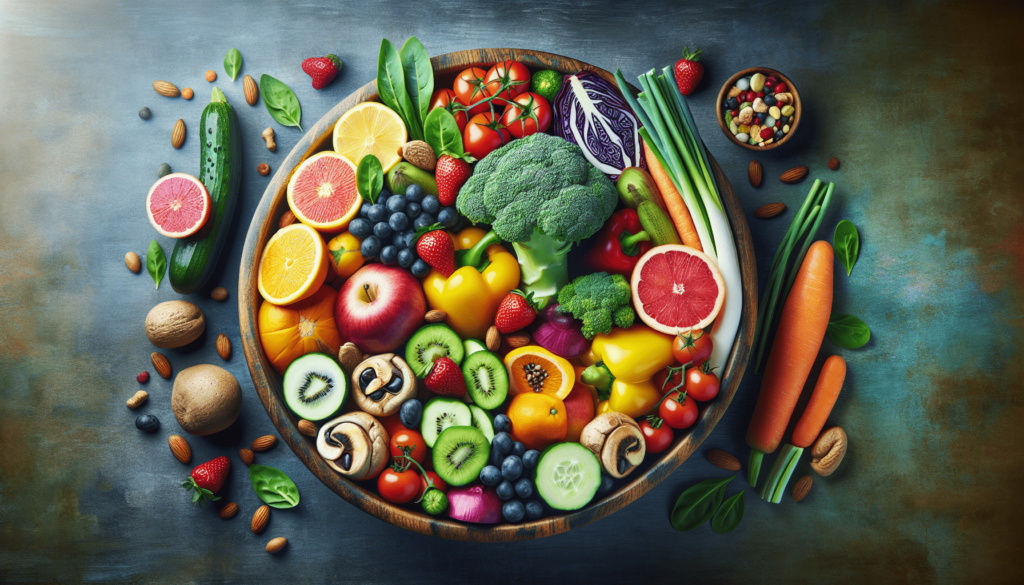Eat A Healthy Diet. Eating A Healthy Diet That Is Rich In Fruits, Vegetables, And Whole Grains Can Help To Give You Healthy, Radiant Skin.
Taking care of your skin is essential to maintain a healthy and radiant complexion. A simple yet effective way to achieve this is by incorporating a healthy diet into your daily routine. By consuming a variety of fruits, vegetables, and whole grains, you can provide your body with the essential nutrients it needs to promote the overall health of your skin. So, say goodbye to dull and lackluster skin and say hello to a glowing complexion by embracing a nutritious diet.
Benefits of a Healthy Diet
Maintaining a healthy diet is not only important for your overall well-being, but it also has numerous benefits for your skin health. By consuming a balanced diet that is rich in fruits, vegetables, and whole grains, you can achieve a radiant complexion and improve the health of your skin. Let’s explore the specific fruits, vegetables, whole grains, and nutrients that can contribute to healthy and glowing skin.
Fruits for Healthy Skin
Citrus Fruits
Citrus fruits, such as oranges, grapefruits, and lemons, are not only refreshing but also great for your skin. They are packed with vitamin C, which is a powerful antioxidant that helps to protect your skin from damage caused by free radicals. Vitamin C also aids in collagen production, promoting skin elasticity and reducing the appearance of wrinkles.
Berries
Berries, such as strawberries, blueberries, and raspberries, are not only delicious but also fantastic for your skin. They are rich in antioxidants and vitamins that help to combat oxidative stress and inflammation in your body, both of which can contribute to skin damage. Consuming a variety of berries can provide your skin with the nourishment it needs to stay healthy and youthful.
Avocado
Avocados are not only a trendy food but also highly beneficial for your skin. They are packed with healthy fats and vitamin E, which can provide hydration and nourishment to your skin. The monounsaturated fats in avocados help to keep your skin moisturized, while vitamin E protects against oxidative damage and supports skin health.
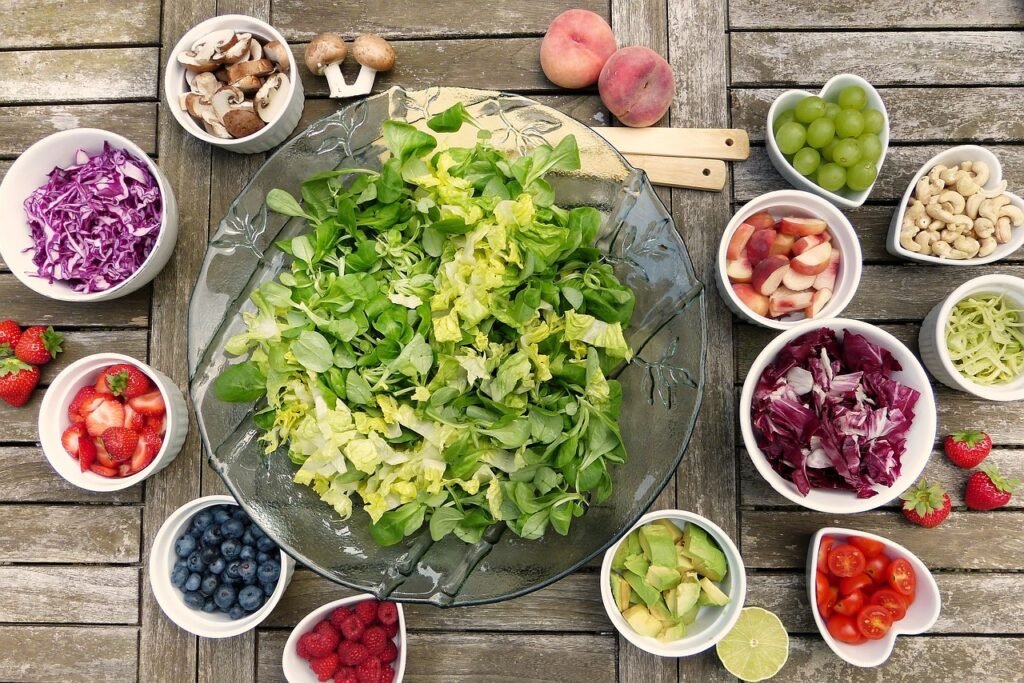
This image is property of pixabay.com.
Vegetables for Healthy Skin
Leafy Greens
Leafy greens, such as spinach, kale, and Swiss chard, are excellent choices for promoting skin health. They are packed with vitamins, including vitamin A and vitamin C, as well as antioxidants that help to protect your skin from environmental damage. The high fiber content in leafy greens also aids in digestion and promotes a clear and radiant complexion.
Carrots
Carrots are not only great for your eyes but also for your skin. They are rich in beta-carotene, which converts to vitamin A in your body. Vitamin A is essential for skin cell production and turnover, helping to maintain a healthy and glowing complexion. Consuming carrots regularly can contribute to improved skin health and reduce the appearance of blemishes.
Tomatoes
Tomatoes are a versatile vegetable that can be enjoyed in various dishes. They are an excellent source of lycopene, an antioxidant that helps to protect your skin from the harmful effects of UV radiation. Additionally, tomatoes contain vitamins A and C, which promote collagen production and aid in skin repair. Including tomatoes in your diet can help you achieve a healthier and more vibrant complexion.
Whole Grains for Healthy Skin
Oats
Oats are not only a delicious breakfast option but also beneficial for your skin. They are a great source of complex carbohydrates, which provide a steady release of energy and stabilize blood sugar levels. This stability can help reduce inflammation in the body, which is known to contribute to skin issues such as acne and eczema. Oats also contain antioxidants and minerals that promote skin health and reduce the signs of aging.
Brown Rice
Brown rice is a nutritious whole grain that can benefit your skin. It is rich in vitamins, minerals, and fiber, which all contribute to a healthy complexion. The high fiber content in brown rice aids in digestion and helps to remove toxins from your body, preventing them from manifesting as skin issues. Additionally, the various vitamins and minerals in brown rice support the overall health of your skin and promote a youthful appearance.
Quinoa
Quinoa is a gluten-free grain that is packed with essential nutrients and protein, making it an excellent choice for maintaining healthy skin. It contains amino acids, including lysine, which aids in collagen production and repair. Collagen is crucial for maintaining skin elasticity and preventing sagging or wrinkles. Quinoa also provides a good dose of antioxidants, vitamins, and minerals that support healthy skin and protect against damage.
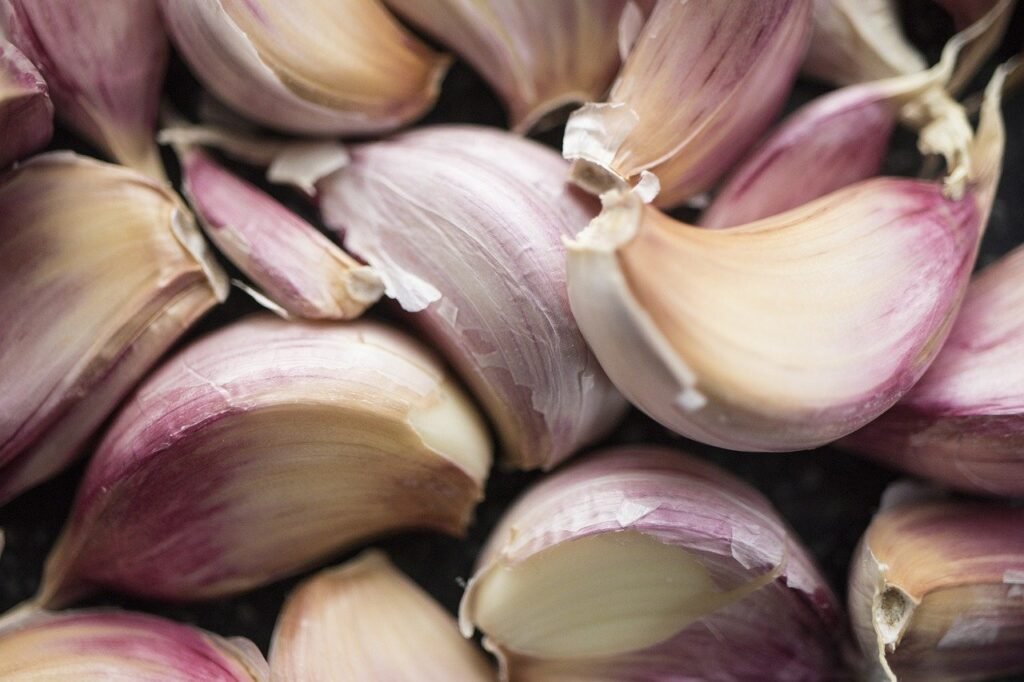
This image is property of pixabay.com.
Antioxidants for Skin Health
Blueberries
Blueberries are often referred to as a superfood due to their numerous health benefits, and their impact on skin health is no exception. They are loaded with antioxidants, such as vitamin C and anthocyanins, which help to neutralize free radicals and protect your skin from oxidative stress. This protection can prevent premature aging and keep your skin looking youthful and vibrant.
Spinach
Spinach is a leafy green vegetable that deserves a special mention for its antioxidant-rich properties. It contains vitamins A, C, and E, all of which work together to combat free radicals and protect your skin from damage. The high iron content in spinach also promotes healthy blood circulation, ensuring your skin receives the necessary nutrients and oxygen for optimal health.
Dark Chocolate
Yes, you read it right – dark chocolate can be beneficial for your skin! Dark chocolate with a high cocoa content is loaded with antioxidants, specifically flavonols, that contribute to skin health. These antioxidants can help reduce inflammation, repair cellular damage, and improve blood flow to your skin, resulting in a healthier and more youthful appearance. However, remember to consume dark chocolate in moderation and opt for varieties with a lower sugar content.
Hydration and Skin
Drinking Sufficient Water
Staying hydrated is vital for overall health, and it also plays a crucial role in maintaining healthy skin. Drinking sufficient water helps to flush out toxins from your body and keeps your skin hydrated from within. When your skin is well-hydrated, it appears plumper, smoother, and more radiant. Aim to drink at least eight glasses of water per day, and increase your intake if you engage in physical activity or live in a hot and dry climate.
Hydrating Foods
In addition to drinking water, consuming hydrating foods can also contribute to healthy skin. Fruits and vegetables with high water content, such as watermelon, cucumbers, and celery, can provide an extra boost of hydration to your skin. These foods not only provide water but also contain essential vitamins and nutrients that promote overall skin health.
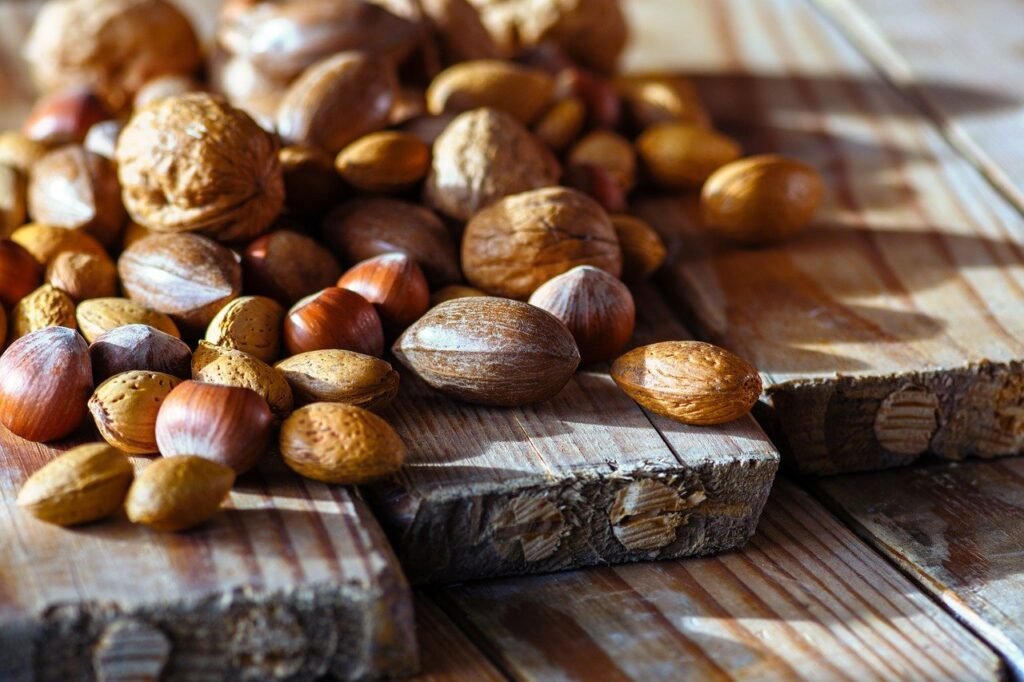
This image is property of pixabay.com.
Nutrients for Skin Health
Vitamin C
Vitamin C is a crucial nutrient for maintaining healthy skin. It aids in collagen production, which helps to keep your skin firm and resilient. Additionally, vitamin C is an antioxidant that protects your skin from free radical damage, brightens your complexion, and promotes a more even skin tone. Incorporate foods rich in vitamin C, such as citrus fruits, berries, and leafy greens, into your diet to reap its skin-boosting benefits.
Vitamin E
Vitamin E is another important nutrient that promotes skin health. It is a powerful antioxidant that protects your skin from oxidative damage caused by environmental factors, such as UV radiation. Vitamin E also helps to moisturize and nourish your skin, leaving it soft and supple. Incorporate vitamin E-rich foods like avocados, nuts, and seeds into your diet to support your skin’s health and vitality.
Omega-3 Fatty Acids
Omega-3 fatty acids are essential fats that offer a multitude of health benefits, including promoting skin health. They help to maintain the integrity and flexibility of your skin cell membranes, resulting in improved hydration and a more youthful appearance. Omega-3s also have anti-inflammatory properties that can calm skin conditions like acne and eczema. Oily fish, such as salmon and sardines, as well as flaxseeds and walnuts, are excellent sources of omega-3 fatty acids.
Effects of Sugar and Processed Foods on Skin
Increased Inflammation
Consuming excessive amounts of sugar and processed foods can have detrimental effects on your skin. These types of foods are often high in refined carbohydrates and added sugars, which can cause a spike in blood sugar levels. This spike triggers a process called glycation, where excess sugar binds to collagen fibers, making them less elastic and more prone to damage. This glycation process leads to increased inflammation in the body, which can manifest on the skin as acne, redness, and overall skin aging.
Accelerated Aging
Sugar and processed foods can also accelerate skin aging. When sugar binds to collagen fibers through the glycation process, it can cause the formation of advanced glycation end-products (AGEs). These AGEs can result in collagen and elastin fibers becoming stiff, leading to the appearance of wrinkles, sagging, and loss of skin elasticity. By minimizing your intake of sugar and processed foods, you can help prevent premature aging and maintain youthful-looking skin.
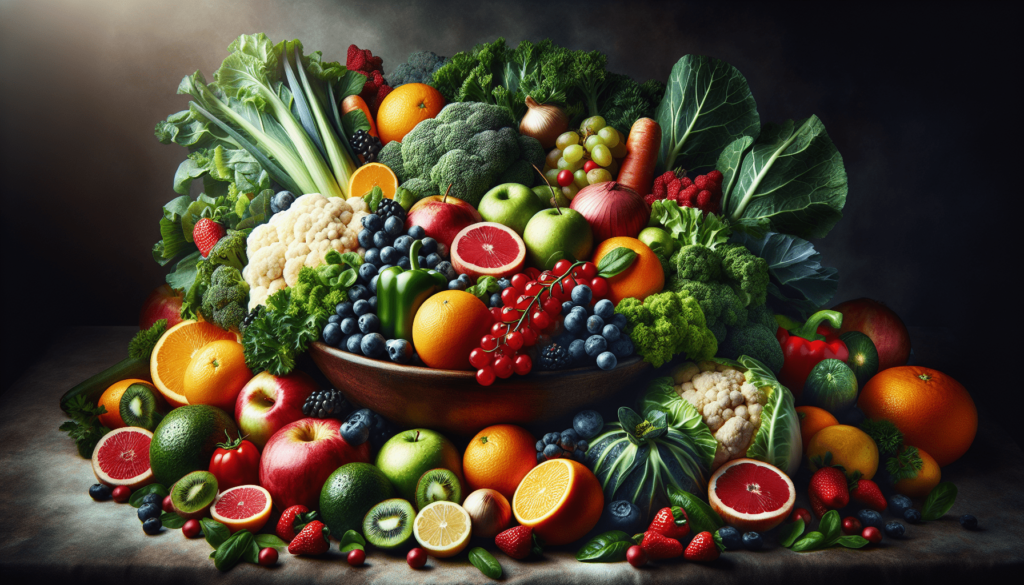
Balanced Diet and Skin Health
Achieving a Balanced Diet
Maintaining a balanced diet is key to supporting your overall health and achieving healthy and radiant skin. A balanced diet should include a variety of fruits, vegetables, whole grains, lean proteins, and healthy fats. Try to fill your plate with different colors of fruits and vegetables to ensure you are getting a wide range of nutrients. Incorporate whole grains, such as oats, brown rice, and quinoa, for sustained energy and added fiber. Include lean proteins, such as fish, poultry, and legumes, for essential amino acids that support skin repair and renewal. Lastly, don’t forget to include healthy fats from sources like avocados, nuts, and seeds for optimal skin nourishment.
Moderation and Variety
While focusing on consuming nutrient-rich foods is important, it’s equally important to have a balanced approach and enjoy everything in moderation. Allow yourself to indulge in your favorite treats occasionally, but try to make them a small part of an overall healthy diet. Variety is also key, as different foods offer different nutrients and benefits for your skin. Incorporate a wide range of fruits, vegetables, whole grains, and proteins into your diet to ensure you are receiving a diverse array of vitamins, minerals, and antioxidants for optimal skin health.
Consulting a Healthcare Professional
Seeking Nutritional Advice
If you are unsure about how to create a healthy and balanced diet that supports your skin health, consider seeking advice from a healthcare professional or a registered dietitian. They can assess your specific needs and provide personalized recommendations to optimize your diet for your skin and overall well-being. They can also help address any specific concerns or dietary restrictions you may have, ensuring that your diet is tailored to your individual needs.
Tailoring Diet to Individual Needs
Everyone’s skin is unique, and it’s essential to tailor your diet to your specific needs and goals. In addition to seeking professional advice, pay attention to how your body and skin respond to certain foods. Keep a food diary to track any changes or reactions you notice when consuming particular foods. This awareness can help you identify any potential triggers or sensitivities and adjust your diet accordingly. Remember, what works for one person may not work for another, so it’s important to listen to your body and make adjustments as needed.
In conclusion, adopting a healthy diet that is rich in fruits, vegetables, whole grains, and essential nutrients can do wonders for your skin health. By incorporating specific foods and nutrients into your diet, you can achieve a radiant complexion, reduce the signs of aging, and promote overall skin health. Remember to stay hydrated, minimize your intake of sugar and processed foods, and consult a healthcare professional to ensure you are tailoring your diet to your individual needs. Your skin will thank you for the nourishment and care you provide through a healthy and balanced diet.
